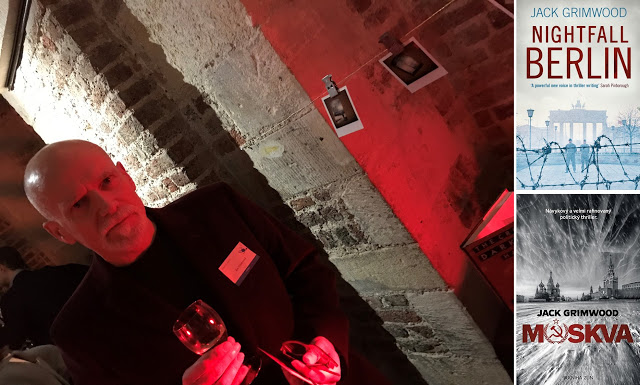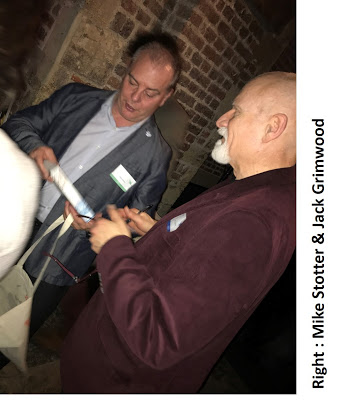
We’ve been energized with the change in direction by the
award-winning writer Jon Courtenay Grimwood, moving deep into
Thriller territory, with last year’s Moskva and this year with the
follow-up Nightfall Berlin which we reviewed
at Shots, stating –
Back in the 1980s with what appears to be a thawing of the
Cold War, British Intelligence’s Tom Fox is sent covertly to East Germany
(specifically the Soviet controlled sector of Berlin), to ex-filtrate a
defector back to the Western sector. As a backdrop to the operation, the
geo-political stage is set with the Nuclear Arms negotiations between East and
West.
As ever and fuelled by paranoia, our Major becomes a Fox on
the Run, as the mission takes a curious and dark turn. The target for Fox’s
ex-filtration mission, the defector Cecil Blackburn is someone that raises
troubling questions back at British Intelligence. There are suspicions raised
about his motives for his return to the West.
Read More HERE
We were delighted that Jon provided our readers a little
context as to the backdrop to the Grimwood thrillers -
When the Berlin Wall fell the West
lost its Enemy
Saddam, bin Laden and Gaddafi were tried out for size, but
none of them really stuck The election of a reasonably unknown ex-KGB colonel
from a not very impressive East German posting changed that. Of course, at
first Putin wasn't the enemy, he was a moderniser: a man determined to bring
Russia in from the cold, who talked of joining NATO. There's a chance this might have happened.
But either Putin genuinely felt encircled - after all,
every ex-Warsaw Pact country apart from Russia now belongs to NATO - or it was
always his intention to turn the West back into an instantly recognisable
enemy. Maybe it simply became pragmatic to turn his country back into a state
its people recognised.
In part, at least, his rise owes a debt to a 1970s Soviet
mini series intended to burnish the reputation of the USSR's intelligence
services. The first episode of Seventeen Moments of Spring in August 1973 when
Putin was 21. Watched by 60 million, it was so popular that streets emptied and
the crime rate dropped. Meetings of the Central Committee were moved so
Brezhnev could watch.
Putin has named Stierlitz, its hero and regarded as the
Soviet James Bond, as an influence on his decision to join the KGB. When
Yeltsin had market research carried out into whom Russians would regard as
their ideal president, Stierlitz was named. When Yeltsin decided Putin should
be the next president, Russia was told that Putin's service in East Germany,
mirrored Stierlitz's work there thwarting Nazis.
So, is Putin the Russian James Bond, Smiley, Karla...?
 One of the West’s biggest problems is they can’t decide.
The bare chested, bear wrestling macho fitness fanatic of the obviously-staged
photographs seems an absurdity to us. But the calendars, posters and matryosha
dolls show that there’s a market for that image. Consciously or not, his
identity fulfils a double function. For the West it defines him as a bit of a
buffoon. Not exactly a thinner, less flatulent Boris Johnson, but quite
possibly out of the same box.
One of the West’s biggest problems is they can’t decide.
The bare chested, bear wrestling macho fitness fanatic of the obviously-staged
photographs seems an absurdity to us. But the calendars, posters and matryosha
dolls show that there’s a market for that image. Consciously or not, his
identity fulfils a double function. For the West it defines him as a bit of a
buffoon. Not exactly a thinner, less flatulent Boris Johnson, but quite
possibly out of the same box.
In Russia, however, it shows he's a vozhd, a strong man in
the mould of Stalin, the heir to the great Soviet dictator and the Czars. The
truth is he's an astute political operator. Quite possible the best currently
alive.
Speaking at the Conservative party Spring forum, Theresa
May said, the UK would 'never tolerate a threat to the life of British citizens
and others on British soil from the Russian government'. Except that it has,
repeatedly. The iconic photograph of Litvinenko on his deathbed was seen
worldwide and did more for Putin’s not-so-soft power than a dozen Soviet
October Revolution march-pasts. It didn't help May that for the last two
decades the City has been allegedly a global washing machine for laundering
dirty Russian money.
Memes cross borders far more easily than tanks, are far
cheaper, and being self-replicating are harder to stop. Lies and propaganda
were always part of the deal, but the explosion of social media makes
information warfare more critical than ever.
An American president with a twitchy Twitter finger, a
United Kingdom so deep into post-imperial delusion that Sunday broadsheets run
features about the country running out of food and no one turns a hair. Sewing
dissent isn’t a precise strategy for Putin. It doesn’t need to be; it simply
needs to weaken the West's infrastructure.
The original Cold War was simpler. Both sides knew where
they stood and it's probably fair to say that both sides miss the certainty.
Well, now the Cold War's back, and Putin’s busy helping us rehang the Iron
Curtain. Only, behind his, he's fighting an altogether more modern war.
© 2018 Jon Courtenay Grimwood
For more information www.jackgrimwood.com